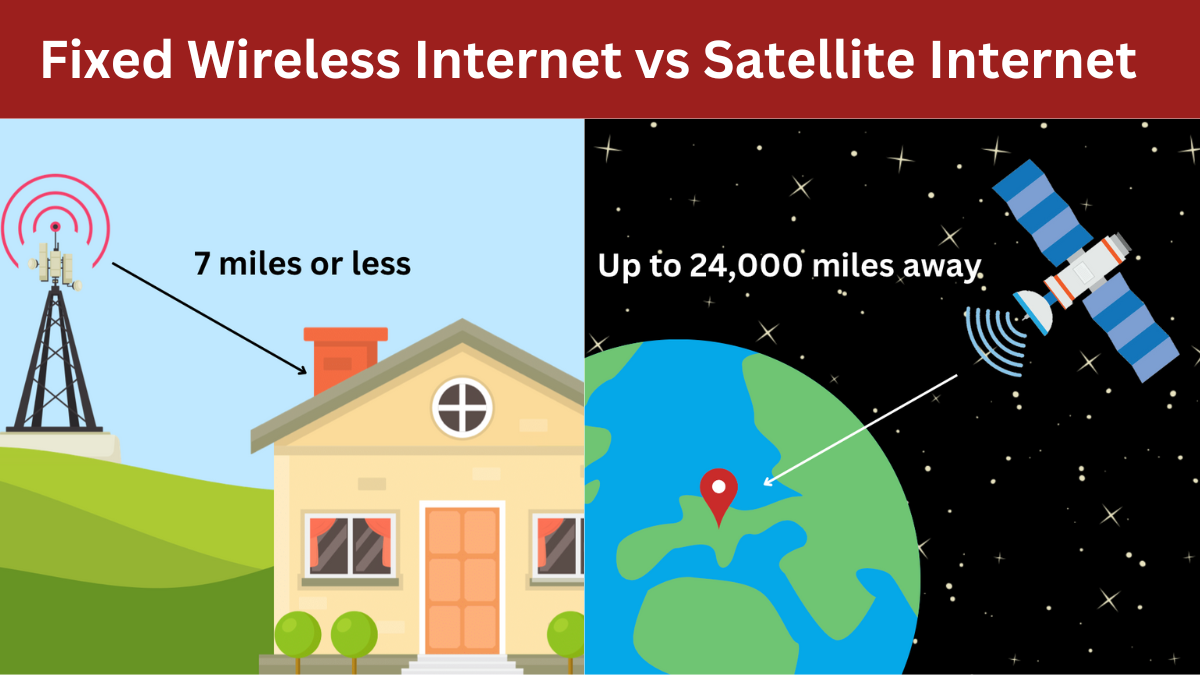Fixed wireless Internet vs satellite Internet: Here are 5 key differences you need to be aware of

If you live in a rural area and want to explore your options for internet service, you might be considering a fixed wireless provider or perhaps a satellite service.
The options can sometimes be overwhelming and the differences a little confusing. It’s important to know what you’re getting with both before making a decision. In this article, we cover the five major differences between satellite and fixed wireless internet service to help you choose the service that’s best for you.
#1 Satellites are in space. Fixed wireless is on a tower.
Satellite internet works similar to satellite TV. Depending on the provider, a signal is sent into space to reach an actual orbiting satellite – sometimes up to 24,000 miles away. Which is cool, but…. the signal must also travel all the way back down to the Internet provider’s Network Operations Center (NOC) and from there, it reaches the public Internet.
That’s a lot of traveling for a signal, which means there is a great risk for slower internet speeds and interference (the average speed of satellite is 10X slower than fixed wireless).
With fixed wireless, your signal comes from a local tower less than 6-9 miles away from your home. A radio device is attached to a vertical tower or other tall structure and sends a wireless signal that quickly gets where it needs to go: to you!
FYI: Even with low-orbit satellite internet, the signal still has to travel a distance far greater than fixed wireless. On average, low-orbit satellite internet is 100-1,200 miles away.
Distance can also impact latency which is the amount of time it takes for data to travel from point A to point B. Latency or “ping” is measured in milliseconds (ms). Satellite ping is usually 500~800 ms, while fixed wireless is around ~30 ms.
#2 Weather (or not).
Weather can be a big disrupter for satellite internet signals.
Heavy moisture in the air from storms or even a very cloudy day with high humidity can interfere with the signal.
With fixed wireless, your signaling device has a shorter distance to travel and it doesn’t breach the atmosphere, so heavy rains rarely cause interference for fixed wireless like they do for satellite. However, strong winds and severe storms could be a factor for both fixed wireless and satellite. Antennas are typically installed securely to the home to avoid wind issues, but the occasional thunderstorm has been known to disrupt even fixed wireless service. (If a repair is needed, see #5 below.)
#3 Unlimited data isn’t always unlimited.
You hear a lot about unlimited data, but always check the fine print.
Satellite service typically has a data cap clause. With this clause, it means when you reach your plan’s data allowance, your satellite service will be “throttled” (slowed down) or stopped completely. You may also be required to pay a fee to continue service that month if you have exceeded your data limit.
With the latest generation of fixed wireless equipment from Watch Communications, our new towers always get unlimited data with no data caps. You will never reach a point where your service is intentionally throttled.
#4 Contract or no contract?
Contracts for internet service lock you in. If you don’t like your service, or the speed package you have isn’t enough for your family, you’ll have to wait until your contract is up before switching.
Satellite internet service almost always comes with a contract—and they are usually binding for 2 years.
Watch Communications makes every effort to be contract free. For most of our packages, we offer service on a month-to-month basis, so you are in control of your options.
#5 Customer service is key
Always make sure to ask your potential internet provider about their customer service hours and equipment repair or replacement policies.
It is not uncommon for satellite providers to offer limited hours of service or no service at all. Which is fine if everything is running smoothly. If your dish or other equipment has a failure or is damaged, then you will find that repairs and/or replacement is going to come with a cost.
At Watch Communications, and for many fixed wireless providers, customer service is available 24/7 and equipment repairs or replacements are covered.
For instance, if your outside wireless receiver is damaged by hail or even fire, we will replace it no questions asked. The same goes for interior equipment like routers.
And for any technical issues or questions you might have, we are available around the clock to help. As a bonus, many of the technicians are local and live in the communities they service.
Now you know.
With so many differences between satellite internet service and fixed wireless, you can see how important it is to understand what you are signing up for before making a commitment.
We also understand that for many rural households, satellite Internet may be their only option. When that is the case, it will be helpful to have an understanding of how it works and what you can expect. Fortunately, we are continuing to invest in the rural communities that we service by expanding our reach and bringing more and more fixed wireless options to areas that haven’t had good options in the past.
Visit our residential Internet page to learn more about our fixed wireless Internet options, or call us at: 1-800-589-3837
